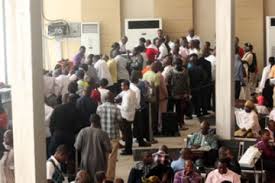
LEGAL REMEDIES FOR DELAYED FLIGHTS by Sogo Akinola
 |
| Credits – punch.com |
Air travelers in Nigeria oftentimes have been cheated by airline
operators by delays without explanation, loss of baggage and unruly behaviour
from both on-ground and cabin crew members just to name a few. Most Nigerians
go through these hurdles everyday without the simplest apology from the
airlines.
operators by delays without explanation, loss of baggage and unruly behaviour
from both on-ground and cabin crew members just to name a few. Most Nigerians
go through these hurdles everyday without the simplest apology from the
airlines.
Many airline passengers
are not conscious of the fact that they can be helped by the Nigerian Civil
Aviation Authority (NCAA) when airlines infringe on their rights especially issues
regarding delayed flights.
are not conscious of the fact that they can be helped by the Nigerian Civil
Aviation Authority (NCAA) when airlines infringe on their rights especially issues
regarding delayed flights.
For
a passenger who has booked a flight departing and landing within the domestic
territory of Nigeria and has confirmed reservation on the flight and also check
in at the scheduled time or no later than 1 hour before departure time is
protected by Part 19 of the NCAA Consumer Protection Regulations which provides for Passengers’
Rights and Responsibilities and Airlines’ Obligations to Passengers. It
addresses consumer protection issues, including, compensation for denied
boarding, delays and cancellations of flights.
a passenger who has booked a flight departing and landing within the domestic
territory of Nigeria and has confirmed reservation on the flight and also check
in at the scheduled time or no later than 1 hour before departure time is
protected by Part 19 of the NCAA Consumer Protection Regulations which provides for Passengers’
Rights and Responsibilities and Airlines’ Obligations to Passengers. It
addresses consumer protection issues, including, compensation for denied
boarding, delays and cancellations of flights.
For
domestic flights, when an operating air carrier reasonably expects a flight to
be delayed beyond its scheduled time of departure, it shall provide the
passengers with reason(s) for the delay within 30 minutes after the scheduled
departure time and the assistance of:
domestic flights, when an operating air carrier reasonably expects a flight to
be delayed beyond its scheduled time of departure, it shall provide the
passengers with reason(s) for the delay within 30 minutes after the scheduled
departure time and the assistance of:
(i)
After
two hours, refreshments such as water, soft drinks, confectioneries /
snacks and access to telephone calls, SMS and E-mails.
After
two hours, refreshments such as water, soft drinks, confectioneries /
snacks and access to telephone calls, SMS and E-mails.
(ii)
Beyond two hours, immediate
reimbursement of flight fare in cash.
Beyond two hours, immediate
reimbursement of flight fare in cash.
(iii) Between
the hours of 10pm till 4am, or at a time when the airport is closed at the
point of departure or final destination, the assistance of a meal, hotel
accommodation and transport between the airport and place of accommodation
(hotel or other accommodation) must be provided.
the hours of 10pm till 4am, or at a time when the airport is closed at the
point of departure or final destination, the assistance of a meal, hotel
accommodation and transport between the airport and place of accommodation
(hotel or other accommodation) must be provided.
Aside
the immediate reimbursement in cash, the passenger can claim from 25% of the flight fare as compensation.
the immediate reimbursement in cash, the passenger can claim from 25% of the flight fare as compensation.
Complaint
Procedure
Procedure
Every
airline shall have a designated officer for the purpose of receiving and
resolving complaints from its passengers. Such designated officers may liaise
with the Authority where necessary.
airline shall have a designated officer for the purpose of receiving and
resolving complaints from its passengers. Such designated officers may liaise
with the Authority where necessary.
A Passenger may make a complaint with the Authority against an
airline in relation to the breach of air passenger rights as provided in the
Regulations by filling and submitting a Complaint Form(available online and at
all airports), after the consumer must have notified the air carrier of such a
breach and the complaint remains unresolved.
airline in relation to the breach of air passenger rights as provided in the
Regulations by filling and submitting a Complaint Form(available online and at
all airports), after the consumer must have notified the air carrier of such a
breach and the complaint remains unresolved.
A
complaint shall be made in writing or electronically and transmitted to the
Authority.
complaint shall be made in writing or electronically and transmitted to the
Authority.
Every complaint shall be accompanied
by:
by:
(i)
A copy of the airline ticket (where
applicable);
A copy of the airline ticket (where
applicable);
(ii)
A copy of the letter to the air
carrier stating a claim for breach of air passenger rights;
A copy of the letter to the air
carrier stating a claim for breach of air passenger rights;
(iii)
Any response or responses or
correspondence thereto;
Any response or responses or
correspondence thereto;
(iv)
Any other relevant document(s).
Any other relevant document(s).
If
the Consumer Protection Directorate of the NCAA rejects your review, you may
refer the matter to the Consumer Protection Council (CPC). Finally, if the CPC
fails to uphold your complaint, you may take the matter to Federal High court.
the Consumer Protection Directorate of the NCAA rejects your review, you may
refer the matter to the Consumer Protection Council (CPC). Finally, if the CPC
fails to uphold your complaint, you may take the matter to Federal High court.
The airlines and
operators have responsibilities to make sure that the service they provide is
of quality. When next your flight is delayed simply smile back to the bank, it
is very easy.
operators have responsibilities to make sure that the service they provide is
of quality. When next your flight is delayed simply smile back to the bank, it
is very easy.
BY- Sogo Akinola






